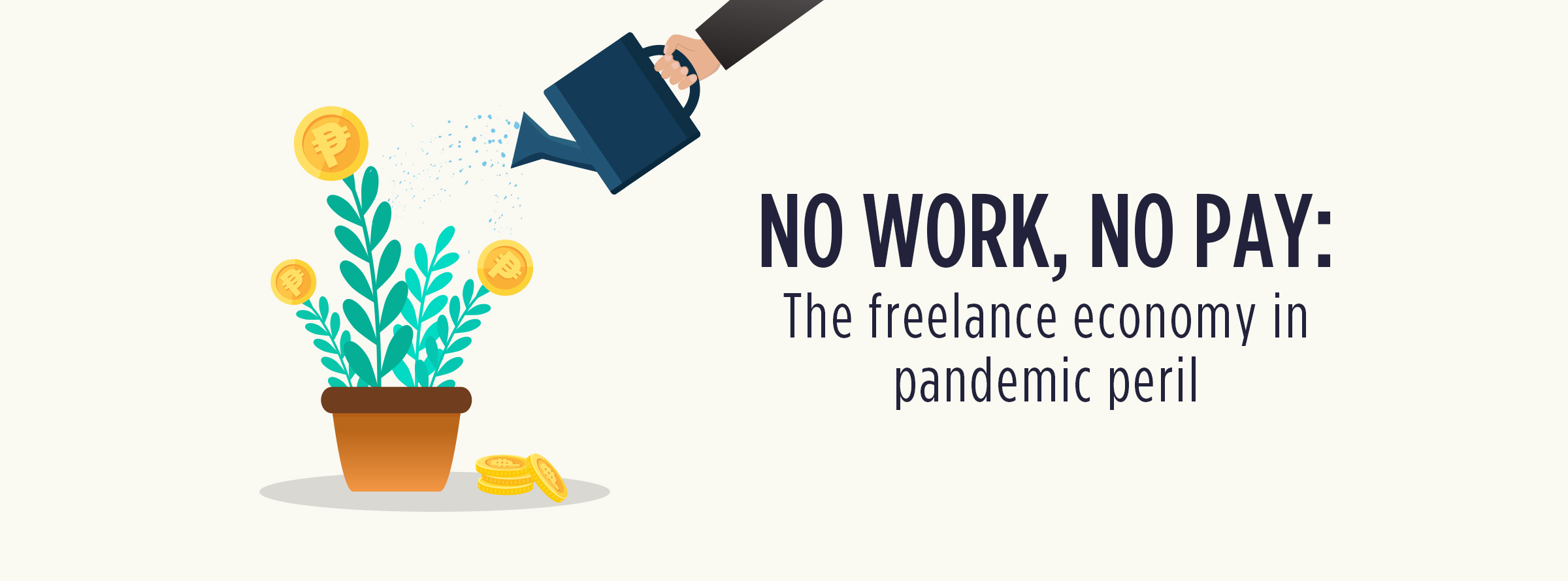No Work, No Pay: The freelance economy in pandemic peril
The global crisis brought about by the COVID-19 pandemic hit the events industry hard. And as dire as the situation may be for event management companies and their suppliers and vendors, it is particularly alarming for the event industry’s sub-economy: the massive pool of freelancers such as production managers and coordinators, creative writers and designers, talents, technical and show directors and stage managers, lights and sounds technicians, photographers and videographers, video producers and editors, food concessionaires and transportation providers, stage riggers and bouncers, and so on.

Unlike full-time employees who have the security of a continued paycheck, health insurance, and other benefits, freelancers are compensated on a strictly per-project basis. Although there are those who get paid for events that require pre-work, most are paid only for day-itself services — and thus, a cancelled event means zero income. In this sense, they’re not different from daily wage earners from other industries like construction or manufacturing.
“Even though I have some savings, I can’t help but be worried,” laments Ikkei Abadies, freelance graphic artist. “It will help me get by for a while, but it’s not going to be enough if this situation goes on for too long.”
Abadies adds that she did receive cancellation fees for some projects she had already started working on before the lockdown was implemented. She is also considering looking for design and layout jobs online that she can do in the interim to make ends meet. While a lot of said online jobs pay significantly less than event projects, she notes that it’s “better than not getting any work at all.”
The same is true for Isay Roque, a freelance writer. Having started her career in corporate communications and branding before expanding her practice to events, she still has projects in the pipeline. “I lost a significant chunk of my income from the postponements and cancellations, but I’m able to manage through projects that aren’t events.”
She does point out that with more freelance writers and other creative professionals looking for jobs online, the oversupply is simultaneously driving down project rates and making competition tougher. “Lowball pricing has been a problem for creatives long before this crisis started, and I expect it to get even worse now.”
“Freelancing is not easy, especially when it comes to saving money, so I’ve tried establishing my own business,” shares Krinel Escalona, a freelance writer who started a clothing line with a friend. “But due to the ECQ, we really can’t operate until that’s lifted.”
But not all event industry freelancers have alternatives to replace their cancelled “rackets” with. This is especially challenging for people with families, like production assistant Anthony Arnaiz, whose jobs are on a strictly no work, no pay basis. His last paycheck, which he received a week before the Metro Manila lockdown order, is being stretched to its limits, and when it runs out, he faces uncertainty along with his colleagues.
Like Arnaiz, freelance stage manager Dale Adriano relies solely on events for income. “I have no other sources, and I’m worried that even when the lockdown ends, events will be few and far between.”
“Right now, I really just depend on my savings,” shares James Gatchalian, a spinner and video jockey for live events. “I follow the six-month rule with budgeting so I’m covered until October, but if it goes beyond that, I’ll definitely get into buy-and-sell to earn money, like some of my friends are doing.”
An increasing number of photographers, videographers, and sound tech professionals have already resorted to selling or trading their equipment in online marketplaces. While this is a fairly common practice in their specific fields, the motivations have changed — from selling to fund upgrades, a lot of them are now selling to get some money to sustain them in the absence of their livelihood.
Loans from financial institutions are not readily available for a lot of freelancers, either. This is especially true for those who are not registered with the Bureau of Internal Revenue (BIR), as most banks require income tax returns (ITR) as proof of repayment capacity.
Making matters worse, many freelancers don’t have health insurance for themselves or their families. Medical care is not cheap, which only adds to their growing list of worries and multiplies their uncertainty in the battle against COVID-19.
Difficult lessons
This situation is forcing freelancers to take a cold, hard look on how they manage their personal finances. Although they are used to and maybe even prepared for low-income periods that could range from weeks to even months, an overwhelming majority cannot in any way be considered ready for the total loss of income, which in this case is made more brutal by its abruptness.
Financial advisers recommend having an emergency savings fund that could cover living expenses for a minimum of three months, or longer if at all possible. Building this fund is not easy, and it’s particularly tricky for freelancers whose pay doesn’t come in regular intervals. It takes a lot of discipline to accomplish this, but it’s necessary.

Personal finance management is a skill, not a talent, and could thus be learned and enhanced over time. There’s a wealth of resources on this topic available online; some are free, others charge a certain amount to access. Event management agencies could also sponsor a seminar for their usual freelancers to help them get started.
Another important thing is insurance. Aside from life insurance policies, some of which come with rider benefits for critical illness and permanent disability, healthcare insurance (also called “HMO” or “health cards”) are also worth its premiums. It gives the insured access to medical services at any given time, without the burden of spot payments for hospitalization, treatments, or doctors’ fees.
Healthcare insurance, however, can be pricey for individuals, moreso for those who have dependents. In this regard, freelancers should consider banding together to form big enough groups that would make them eligible for corporate rates with an HMO provider. They will still be paying their own premiums, of course, but it will be much cheaper.
Aside from having emergency savings and insurance, an important lesson freelancers are learning — or should learn — in the middle of this crisis is the necessity of having more than one income source. Savings are bound to be depleted over time, and insurance is not exactly spending money. Personal financial security comes with having at least three revenue streams, more for those who have families.
The lack of capital is a common deterrent for people to start even a small business, but there are alternatives that don’t require a cash outlay. Some examples are commission-based property brokerage and insurance sales, or online jobs like social media manager, a language tutor, a virtual assistant, or a data encoder. The investment required is the time and effort to acquire new skills or expand current ones.
Freelancers who are already in this track can help those who are just getting started by sharing leads for possible income-generating activities that others can pursue, preferably those that can be done remotely while the quarantine is still in effect. They can also outsource projects, or parts of it, to their colleagues whose skills match the requirement, and pay them accordingly, of course.
These are difficult times for everyone, but if freelancers take it on with the same A-game they bring to the events they’re part of, it’s not hopeless. And when the crisis is over, everyone would have become stronger, smarter, and overall better — ready for the industry’s big rebound.
